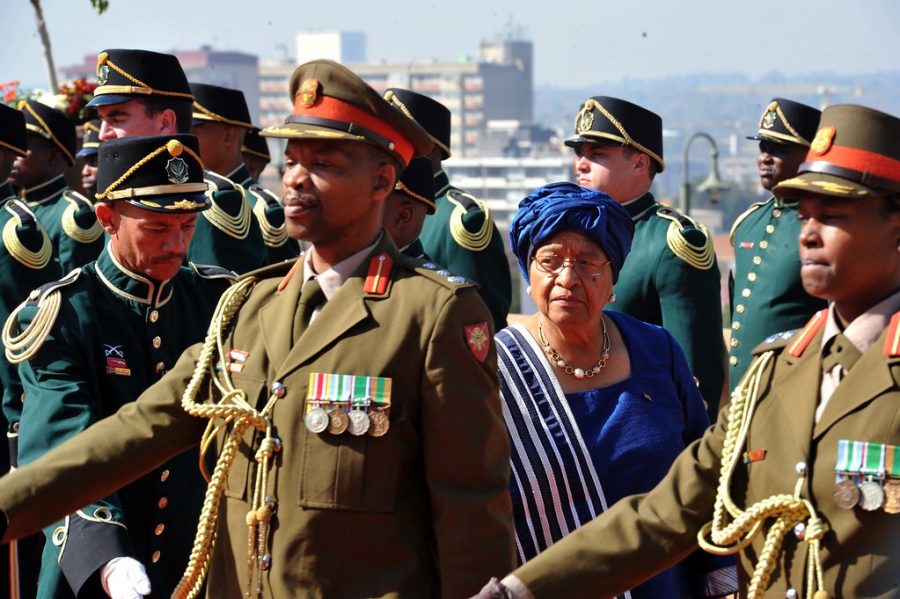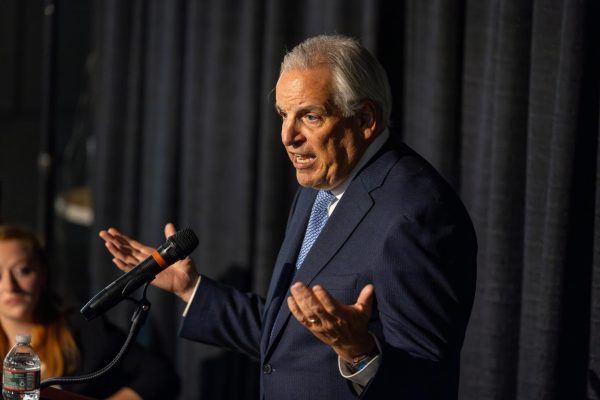Women who paved the way: Ellen Johnson Sirleaf
Courtesy of GovernmentZA on Creative Commons
Ellen Johnson Sirleaf became the first female head of state in Africa when she was sworn in as President of Liberia in 2006.
In light of Women’s History Month, The Hawks’ Herald is featuring important women from throughout history. The second week of March highlights women who have paved the way in politics.
Ellen Johnson Sirleaf was born on Oct. 29, 1938 in Liberia. She attended the College of West Africa and married James Sirleaf when she was 17. In 1961, she left Liberia to study in the United States.
She earned degrees in economics and business administration and in 1971, she received her master’s degree in public administration from Harvard University. When she returned to Liberia, she worked as the assistant minister of finance from 1972 to 1973.
Sirleaf then worked as the finance minister from 1980 to 1985 under the military dictatorship of Samuel K. Doe. While in her position, she clashed with both heads of state, was imprisoned twice and barely escaped execution. In 1985, she ran for a seat in the Senate but was a fierce and vocal opponent of the military government which led to her arrest and sentence to 10 years in prison.
She served some of that sentence before being released and exiled from the country. She spent 12 years in exile and lived in both Kenya and the United States as civil war broke out in Liberia. During this time, she became an influential economist for major financial institutions.
From 1992 to 1997, Sirleaf served as the director of the Regional Bureau for Africa of the United Nations Development Program. Once a truce was reached in Liberia’s civil war, Sirleaf returned to her home and ran for President for the Union Party in 1997.
She lost the race against Charles Taylor and was forced back into exile after being convicted of treason. In 1999, another civil war began in Liberia and in 2003, Taylor was exiled. Sirleaf once again returned to Liberia where she served as the chair of the Commission on Good Governance, an organization focused on preparing for democratic elections.
In 2005, she ran for President and came in second place during the first round of voting. In the runoff election, Sirleaf won against George Weah. On Jan. 16, 2006, Sirleaf was sworn in as the President of Liberia, thus becoming the first woman to be elected head of state in Africa.
She was faced with many challenges as she took control of the nation; unemployment sat at 80% and 15,000 United Nation Peacekeepers occupied the country. By 2010, Liberia’s debt was completely gone and foreign investments brought in millions of dollars.
Sirleaf focused on healing the nation and established a Truth and Reconciliation Committee to deal with corruption and ethnic tensions. In 2011, Sirleaf once again ran for President and received 43% of the vote as she ran against 11 candidates. A runoff election was necessary since she did not receive more than half the votes.
In this election, she won over 90% of the vote. Although her second term hit bumps as allegations of nepotism and corruption came against Sirleaf, she remains a positive figure in Liberia’s history. She left the Presidential office after transferring her power to George Weah in 2018.
In 2007, Sirleaf was awarded the Presidential Medal of Freedom in the United States for her commitment to spreading freedom and bettering the lives of Liberian citizens. In 2011, Sirleaf received the Nobel Peace Prize for promoting peace and reconciliation in the time following the war as well as making social and economic developments in the country.
Her unwavering commitment to bettering the citizens of Liberia and maintaining democracy in the country are just some of the reasons she earned the nickname “The Iron Lady.”
Emily Dvareckas graduated from RWU in 2022 with a degree in forensic science. She spent three years with The Hawks’ Herald as the photo editor...






